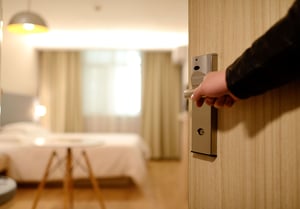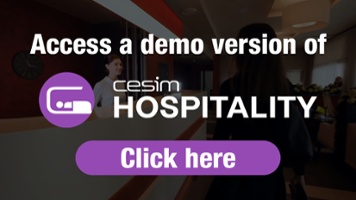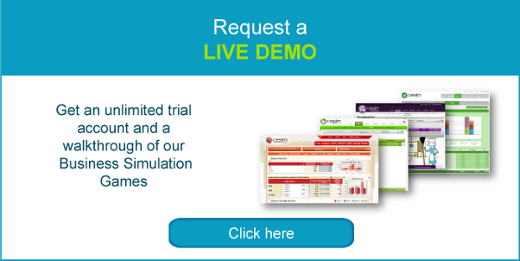 It's no secret that the hospitality sector has been one of the most affected industries by the COVID-19 pandemic. The global health crisis has touched not only business owners, but future professionals in the tourism sector as well. With a significant portion of hotels, restaurants and other leisure businesses closed or downsized for the time being, hospitality higher-education students have seen their opportunities to put their education in practice limited. While the world and the tourism industry recovers, business simulations offer an opportunity for higher education institutions to provide a place for their students to make use of their knowledge.
It's no secret that the hospitality sector has been one of the most affected industries by the COVID-19 pandemic. The global health crisis has touched not only business owners, but future professionals in the tourism sector as well. With a significant portion of hotels, restaurants and other leisure businesses closed or downsized for the time being, hospitality higher-education students have seen their opportunities to put their education in practice limited. While the world and the tourism industry recovers, business simulations offer an opportunity for higher education institutions to provide a place for their students to make use of their knowledge.
Training for the worklife

Employers expect higher-education graduates not only to have theoretical knowledge in their professional field, but also the practical skills and knowledge to think independently and ability to adapt to new and challenging situations, as well as valuable soft skills such as communication, teamwork, interpersonal skills and problem-solving mentality.
That's why a crucial part of a students' professional training is the internship. Unfortunately, the pandemic has also affected the access to prospective traineeship positions. For example, a survey by OneClass shows that 71% of higher education students in the US consider that internship opportunities in their field of study have decreased during the pandemic.
Faced with the lack of internship opportunities, institutions can look at business simulations as an alternative to the traineeship experience. Indeed, business simulations offer a realistic approach to the challenges that future professionals will face in the workplace. Participants also get the chance to apply and improve their business skills, both hard and soft.
In terms of students' employability, simulations are reported to have an impact on student work-readiness and give students an opportunity to practice fundamental skills of their study disciplines, encourage decision making and team-working, and enhance the student learning experience. Industry limitations to take up students or safety concerns, (such as is the case after the COVID-19 pandemic) are in this day and age more than valid reasons to take into consideration using a business simulation as a viable work-integrated learning alternative.
Simulating hospitality
The hospitality sector is no different. Business simulations are already considered effective in helping students apply the principles and concepts of finance, accounting, service quality, marketing and human resource management as it applies to the tourism and hospitality industry, as well as to test their critical and analytical thinking abilities.
Moreover, hospitality business simulations are already being used in so-called simulated or virtual internships. In this type of experience, a business simulation game provides structured learning experiences within an "immersive virtual environment that replicates a real-world setting" while also providing experiences working in a team that are not normally available in a classroom.

Cesim's hotel and restaurant management simulation, Cesim Hospitality, offers an engaging and hands-on approach to teaching and putting hospitality concepts in practice. Cesim Hospitality's modularity allows instructors to choose whether participants experience both a lodging and food & beverage operations scenario, or only one of them. Instructors can also modify and create their own personalized cases. Moreover, future hospitality professionals become familiarized with the tourism industry conventions by analyzing their simulation results, which are reported according to the most widely used standard for financial reporting in the sector, the Uniform System of Accounts for the Lodging Industry (USALI).
Overall, Cesim Hospitality provides a comprehensive and realistic experience of what it means to run operations in the hospitality sector. The simulation can be used by higher-education institutions as a viable alternative for their students to approach the nuances of running a business in the tourism sector. In the words of Pascal Lamoussière, Program Supervisor of the Bachelor's Degree in Culinary Arts and Restaurant Management at the Institut Paul Bocuse (France), "for hospitality, it's important [for students] to understand that it’s a human resources industry. It’s usually 80% human problems, and 20% customer problems. With this, they can understand, when they play the simulation, it’s very complicated, it needs real precise skills in order to be efficient."
Read more:
- 6 Concepts to Practice with Cesim Hospitality Simulation
- NYU's Jukka Laitamäki Discusses The Cesim Hospitality Simulation
- Running a Hospitality Course with a Hotel and Restaurant Simulation
- Business Simulations help achieve learning goals and acquire skills
- Business simulations – as close as it gets to the real deal
Sources:
- Using simulations to improve skills needed for workintegrated learning before and during COVID-19 in Namibia; Iipinge, Balthomeus, Pop; 2020
- Business simulations: A balanced approach to tourism education; Martin; 2003
- Virtual internships and work-integrated learning in hospitality and tourism in a post-COVID-19 world; Bilsland, Nagy & Smith; 2020


